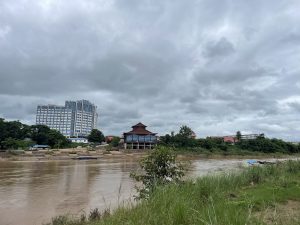The six Mekong River countries plan to bolster their efforts to combat online scamming and arms dealing in mainland Southeast Asia, amid a quickening flow of reports about human trafficking and criminal activity in the region.
The meeting, which took place in Kunming on Tuesday, brought together law enforcement officials from the six nations of the Lancang-Mekong Cooperation mechanism – China, Myanmar, Cambodia, Laos, Thailand, and Vietnam – in addition to United Nations officials and other regional law enforcement officers.
During the meeting, representatives from the six nations “unanimously agreed to strengthen comprehensive cooperation, launch targeted operations, and adopt strong measures to resolutely combat telecom fraud and its derivative crimes,” the Global Times reported. It said that they would make efforts “to fully coordinate the rescue of trapped individuals, apprehend the leaders of criminal groups, and dismantle telecom fraud dens.”
According to Chinese state media reports, the Lancang-Mekong Integrated Law Enforcement and Security Cooperation Center (LMLECC), which includes the six Mekong River nations, will begin the second phase of an operation against criminal activities including scam operations in 2025.
“The operation brings together the law enforcement resources of various countries and is an effective cooperative force in the fight against telecommunications fraud and arms smuggling in the region,” China’s embassy in Myanmar said in a statement on Tuesday, which was quoted by Radio Free Asia (RFA). “All parties unanimously agreed that regional security and stability were effectively protected.”
The first phase of the LMLECC’s crackdown, dubbed Operation Seagull, took place from August to December 2024, during which time it resulted in a collective 160 busts on telecommunications fraud operations, in which more than 70,000 criminals were arrested and 160 victims were rescued, Chinese state media reported.
The past few years have seen an alarming rise in industrial-scale online scamming operations in the region, particularly in loosely regulated parts of Cambodia, Laos, and Myanmar. These operations have relied on a large indentured workforce – mostly ordinary people who have been attracted by promises of employment, only to be kept imprisoned and forced to operate various types of digital scams, often on pain of beatings, mistreatment, and torture.
The scam issue once again attracted attention this month when the Chinese actor Wang Xing went missing on January 3 near the Thai-Myanmar border. Wang was rescued four days later from a scam center in Shwe Kokko, a notorious scam hub close to the town of Myawaddy in eastern Myanmar close to the Thai border.
According to RFA, the case has prompted a number of Chinese group tour cancellations for the upcoming Lunar New Year, suggesting that fear of being trafficked into scam operations threatens Thailand’s economically pivotal tourism industry. In response, the Thai government has rolled out a public relations campaign, including an AI-generated video of Prime Minister Paetongtarn Shinawatra speaking Mandarin, in order to reassure Chinese visitors that tourist safety is a top priority.
During Tuesday’s meeting in Kunming, senior officials from China, Myanmar, and Thailand “exchanged views on cooperation aimed at eliminating the telecom fraud base in Myawaddy,” the Global Times reported. Under pressure from the Myanmar military and the Thai government, after the Wang Xing story broke, the ethnic Karen Border Guard Force that controls Myawaddy promised to crack down on the scam operations and human trafficking taking place within its territories.
The LMLECC’s meeting came after China’s Foreign Minister Wang Yi told a meeting of ASEAN diplomats in Beijing that Southeast Asian countries needed to take strong measures to crack down on online gambling and fraud operations.
As I noted at the time, inter-state cooperation is a necessary but not sufficient precondition for eliminating the Mekong region’s scamming scourge. The fact remains that many scam operators flourish mostly in exactly those locations where state jurisdictions, and hence, the reach of national law enforcement agencies, are weakest. These operations have taken the deepest root in rebel-held regions of Myanmar, where Naypyidaw’s writ runs thin and neighboring countries have only limited leverage, and in Cambodia, where the alleged collusion of elements of the state has maintained a sanctuary for scamming syndicates.
Even though the region’s newspapers are filled with reports of crackdowns and rescues from scam centers, the region’s criminal syndicates have proven themselves willing and able to relocate to more accommodating climes.

































